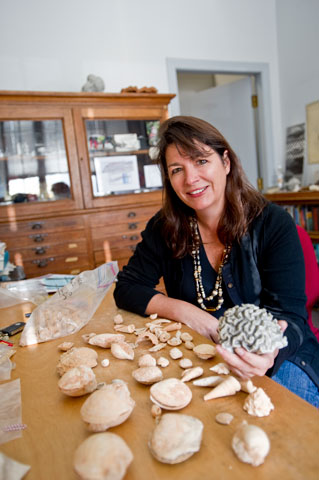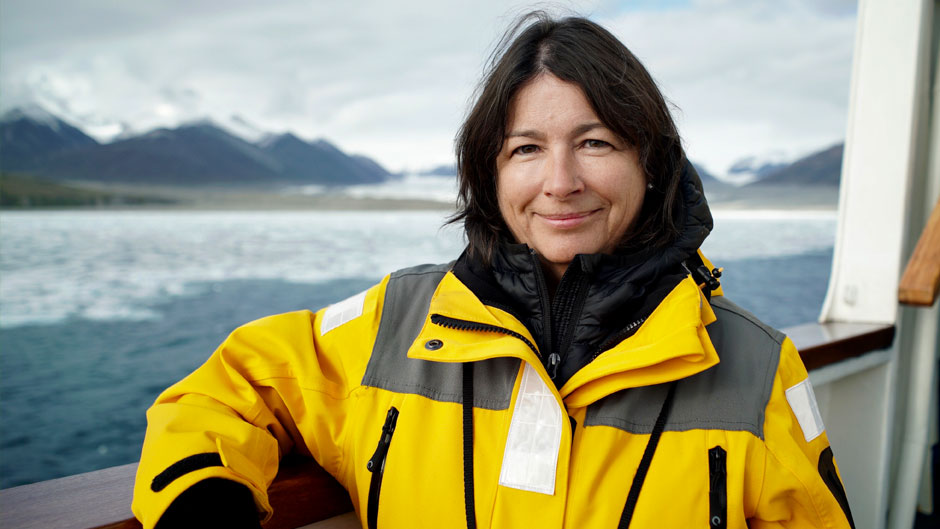In a highly meticulous manner, Maureen Raymo can describe Earth’s ancient climate as if she experienced it firsthand. There’s no magic to her amazingly accurate account, just solid evidence in the form of deep-sea sediment cores that contain microfossil remains of plankton from millions of years ago.
By analyzing such primordial matter, Raymo, a paleoceanographer and geologist at Columbia University’s Lamont-Doherty Earth Observatory, is able to determine atmospheric carbon dioxide levels and global temperatures from millennia ago, giving us not only a record of the climate of yesterday but also a look at what awaits our world of tomorrow. It is a future fraught with global warming and rising sea levels.
“It’s been scientists in my field in concert with climate modelers who have been sounding the alarm on global warming for the past 30 years at least,” said Raymo. “We understand the important role C02 plays in controlling mean global temperatures and, therefore, the amount of ice at the poles and the height of the seas.”
The first woman ever to win the Geological Society of London’s prestigious Wollaston Medal in the award’s 187-year history, Raymo will put climate change on center stage at the University of Miami next month when she visits the institution as a UM Distinguished Presidential Scholar, giving two in-depth talks on a much-debated issue she says the U.S. isn’t doing enough to address.
“Two decades ago we paid more attention to climate change than we do now, and that has nothing to do with science but everything to do with government policy,” said Raymo, alluding to the Trump administration’s decision last year to pull the U.S. out of the Paris climate accord. “We’re one of the few nations in the world that’s not onboard with helping to solve a problem we singularly had the biggest hand in creating.”
A member of the National Academy of Sciences, Raymo will present two lectures that will be free and open to the UM community:
- “Climate and Sea Level Rise: What Can You Do About It?” on Tuesday, November 6 from 6 to 8 p.m. in the Ungar Building, room 230, on the Coral Gables campus; and
- “Climate, C02, and Sea Level: Past is Prologue” on Friday, November 16 from 4 to 5 p.m. in the Rosenstiel School of Marine and Atmospheric Science auditorium, with a reception to follow.
 Raymo will participate in a series of scientific roundtables on topics ranging from atmospheric dust to ancient shorelines to women in the geosciences. “We also have a field trip planned to see local geological formations, an ancient sea level record right under our feet,” said Amy Clement, a Rosenstiel School professor of atmospheric sciences.
Raymo will participate in a series of scientific roundtables on topics ranging from atmospheric dust to ancient shorelines to women in the geosciences. “We also have a field trip planned to see local geological formations, an ancient sea level record right under our feet,” said Amy Clement, a Rosenstiel School professor of atmospheric sciences.
Clement, who leads a climate modeling research group, and Raymo studied at the same academic program at Columbia University in which “looking at past climates was seen as absolutely essential to understanding where we are and where we are headed,” said the UM researcher.
Raymo’s scheduled visit to UM will not be her first to the institution. Last year, she spoke at the University’s Rosenstiel School of Marine and Atmospheric Science as part of its Sea Secrets lecture series, lecturing on natural climate variability and its relevance to current global warming.
“Dr. Maureen Raymo is one of the sharpest minds of our generation whose work on past climate and its variation provides a lens through which we can examine contemporary climate change,” said Sam Purkis, professor and chair of the Rosenstiel School’s Department of Marine Geosciences, which will host the renowned researcher. “Maureen’s visit to UM will catalyze ongoing work by our faculty, staff, and students on all aspects of climate change, including sea level rise, and raise the caliber of the institute in this arena.”
Raymo grew up watching legendary French oceanographer Jacques Cousteau on TV, and it became her dream to explore the world by land and sea. She studied geology at Brown University and earned her Ph.D. from Columbia.
While still in her 20s, she devised the so-called Uplift-Weathering Hypothesis, which ties global cooling and the onset of the ice ages to a drawdown in atmospheric CO2 caused by the uplift of the Himalayas and Tibetan Plateau.
In addition to publishing fundamental work on the stratigraphy and chronology of the recent geologic epochs, Raymo has also proposed hypotheses explaining the patterns of ice sheet variability observed over the last few million years and developed new ways of studying past sea level change.
Most recently her research group has focused on the reconstruction of sea level and ice volume during past warm climate intervals with the goal of improving predictions of future sea level rise in response to global warming.
She directs the Lamont-Doherty Core Repository, the world’s largest collection of deep-sea sediment cores.
“Sea level change is the area of research I spend most of my time studying,” said Raymo, who was raised in Easton, Massachusetts, by a father who taught college physics and a mother who taught children with learning disabilities. “I love talking to people about the science of global warming and the science of polar ice sheets and sea level from the perspective of all the amazing knowledge we’ve acquired about our planet.”
With the Earth of today being 1 degree centigrade hotter than pre-industrial levels because of climate change (which is enough to melt 28 to 44 percent of glaciers worldwide, according to a new report by the U.N. Intergovernmental Panel on Climate Change), it is critically important, she said, that students in all academic fields have a basic understanding of the science and history of climate and global warming.
“There are very few businesses and organizations and very few directions in which they’ll go where they’re not going to have to address the issue of sustainability and climate change. Even if they’re managing hedge funds, their stockholders are going to want to know how their funds are impacting global sustainability.”
She calls Florida “ground zero for sea level rise.”
“Florida is facing some really serious challenges,” said Raymo. “It’s not an exaggeration to say that the future viability of the southern half of the state is at stake. People need to educate themselves and start working at the local level to address this problem. And it is addressable. All the technology we need to solve the global warming problem is in hand.”

